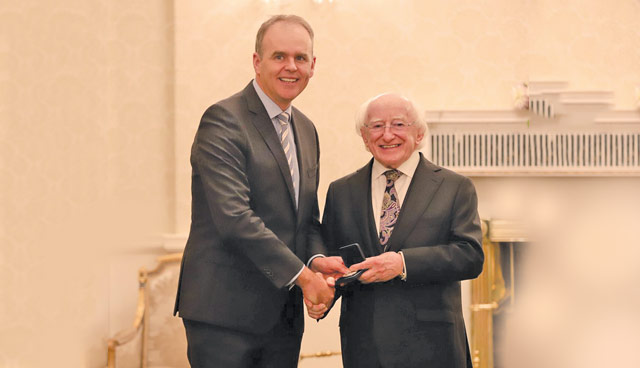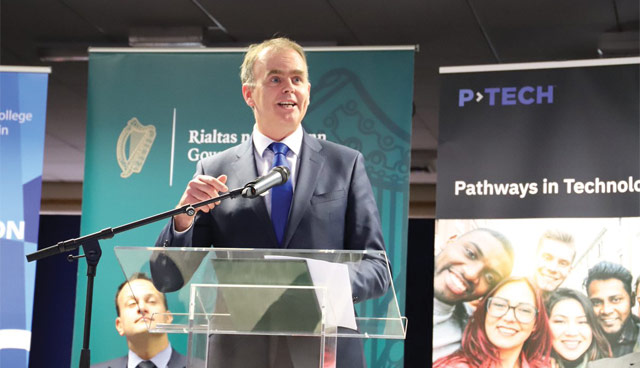Steep learning curve: Education Minister Joe McHugh TD


A qualified post-primary teacher, Minister Joe McHugh TD has assumed responsibility for the Education and Skills portfolio. The Deputy for Donegal faces a test of mettle in a Department struggling with demographic demands and budgetary strains.
In February 2018, the former Education Minister Richard Bruton TD launched the second annual Action Plan for Education which establishes “our aim to make the Irish Education and Training service the best in Europe by 2026”. Now, the pursuit of this ambitious, if not ambiguous objective, falls to his successor Minister Joe McHugh TD. The 2018 action plan lists over 100 actions and hundreds of sub actions.
Parachuting into the Department from his previous role as Minister of State for Gaeilge, Gaeltacht and the Islands, the Minister now has responsibility for 64,000 teachers and 934,000 young people across 4,000 schools.
Budget
Gross Voted Current Expenditure in Education and Skills for 2019 is €9.8 billion, an increase of €479 million while Gross Voted Capital Expenditure for 2019 is €941 million, an increase of €196 million. The allocation of a total of €10.8 billion in Voted Expenditure to the Department represents a 6.7 per cent increase on 2018.
However, figures for the percentage share of gross voted expenditure for 2019 indicate that the Education and Skills share of total expenditure is set to fall slightly as Health and Housing, Planning and Local Government are prioritised.
The allocation includes €66 million “to meet our changing demographic needs” by creating 1,200 new posts in schools and an increase of 5 per cent to the capitation rate per pupil in 2019. A further €1.8 billion is earmarked for children with special educational needs, facilitating the recruitment of an additional 950 special needs assistants (SNAs).
As in 2018, Finance Minister Paschal Donohoe reiterated a commitment to a 0.1 per cent increase in the National Training Fund (NTF) for 2019 and 2020. This, he said, enables him to create 15,000 new places in higher education as well as further education and training. These include:
- >1,200 craft and earn-as-you-learn places;
- 1,100 traineeships;
- >8,000 places through Skillnet and Springboard; and
- 5,000 ‘new lifelong and flexible learning opportunities’.
Alongside an additional 3,500 undergraduate positions in 2019, this represents “a significant response to the global uncertainties facing the economy, including Brexit”. As such, a portion of the NTF surplus will establish a €300 million “multiannual, ring-fenced Human Capital Initiative” to increase investment in higher education.
The €196 million capital investment will be utilised to help create 18,000 additional permanent places and 5,000 replacement places in schools, an upgrade of ICT infrastructure across schools and €150 million for investment in: higher education; further education and training; and research.
ASTI President Breda Lynch has criticised Budget 2019 for failing to address a “funding crisis” in education. “Budget 2019 does little to reverse swingeing cuts implemented during the recession. In 2019, at a time of growing student numbers, curriculum change in schools and significantly-increased teacher workload, our second-level schools will continue to have a lower ratio of teachers to students, and less capitation funding, than they did in 2009,” says Lynch.
Likewise, INTO General Secretary Sheila Nunan argues: “While there has been a modest restoration, primary school teachers and parents have been let down by this inadequate increase in the capitation grant. Resulting from this decision, teachers will continue to have to fundraise for basic expenditure in schools and parents will still have to dig deep into their pockets to cough up voluntary contributions.”
“Teachers only have a certain amount of time. They are under pressure and I referenced initiative overload already, so we have to take stock of what [former Education Minister] Bruton and the committee as a collective have been working on and the initiatives that have been taking place within the Department over the past two and a half years.”
‘Initiative overload’
Acknowledging that “teachers only have a certain amount of time”, in his first address to the Oireachtas Joint Committee on Education and Skills, Minister McHugh referred to an “initiative overload” faced by teachers. “They are under pressure and I referenced initiative overload already, so we have to take stock of what [former Education Minister] Bruton and the committee as a collective have been working on and the initiatives that have been taking place within the Department over the past two and a half years,” he said. “I am happy to do an evaluation of where we are at. Let us see what is working and what areas we can do better in.”
Later, in an interview with Sunday Business Post political editor, Michael Brennan, the Minister reiterated: “What I want to do now is take stock of the things that are working. There will be weaknesses in that too. One of the fundamental weaknesses I’m picking up from teachers is that there may be initiative fatigue as well.”
Pay inequality
McHugh could offer an olive branch to teachers by addressing the inequality in the pay scale for ‘new’ (post-2011) entrants. However, speaking to eolas Magazine earlier in 2018, his predecessor, the then Education Minister, Richard Bruton TD, emphasised the reality of budgetary constraints.
While acknowledging that the teachers’ unions regard the wage gap as ‘unfinished business’, he said: “I suppose for a government, we have to balance different demands… This other issue of the new entrants is one that will be a longer-term issue for government to decide what money is committed. Money hasn’t been assigned to it at this point, but that is a work in progress.”
Education at a glance
As a proportion of overall government expenditure, Ireland invested 13 per cent in education in 2015. This is above the OECD average of 11 per cent. However, a high share of total government expenditure devoted to public expenditure on education does not necessarily translate into a high share when compared to a country’s GDP.
The OECD’s ‘Education at a Glance 2018’ report indicates that of 33 OECD countries, Ireland is joint last in education expenditure as a percentage of GDP. The report found that Ireland invests only 3.3 per cent of GDP, compared with an OECD average of 4.5 per cent and an EU average of 4.2 per cent. “This can be explained by the relatively low level of total government expenditure compared to GDP in Ireland (29 per cent),” the report states.

While Irish teachers receive salaries slightly above the OECD average, the report reveals that the same teachers spend more time in classrooms than the majority of OECD countries. For instance, in 2017, Irish primary school teachers had 910 hours of statutory contact time, well above both the OECD average of 777. Similarly, while the average primary classroom across the OECD had 21 students in 2016, there were 25 in Irish classrooms – the fifth highest.
Third level
Similarly, a recent Department report on the ‘Projections of demand for full-time third level education, 2018 to 2040’ indicates that full-time enrolments have “grown substantially” over the last decade. Between 2007 and 2017, there was an increase of 32.8 per cent as enrolments grew from 138, 319 to 183,642.
The report noted that alongside demographic demand, more pressures are likely to emerge as a consequence of “policy initiatives that aim to increase participation in higher education from underrepresented socio-economic groups, mature students, international students and further education graduates”.
Teachers’ Union of Ireland (TUI) General Secretary John MacGabhann has suggested: “The additional €57 million in current funding announced for higher education is woefully inadequate and will do very little to boost a sector that has been devastated by steep funding cuts. The failure of Government over successive years to make the necessary investment has had an extremely damaging effect on the working conditions of academic staff, on student experience and on the positioning of Irish institutions in international rankings.”
Indeed, the QS World University Rankings for 2019 indicate that three-quarters of Ireland’s colleges have slipped down the rankings. TCD has fallen out of its top-100 spot from 88th to 104th, UCD from 168th to 193rd, NUIG from 243rd to 260th, UCC from 283rd to 338th, DCU from 391st to 422nd and DIT from the 651-700 category to the 751-800 category. Only the University of Limerick and Maynooth University avoided tumbling down the rankings.
Junior Cycle history
Most recently, Minister McHugh announced a review of the optional status of history under the new Framework for Junior Cycle. The Minister has met with the National Council for Curriculum and Assessment (NCCA) to discuss the review, which is expected to be completed by the end of March 2019.
A component of the Junior Cycle Framework rollout, the new specification for history was introduced to schools in September 2018. Of the 21 subjects provided for by the new Framework, only maths, English and Irish are mandatory. Previously, while history was a mandatory subject in just over half of all post-primary schools, nine-in-10 pupils studied the subject at Junior Cycle.
Speaking in relation to the review, the Minister outlined: “It is very important that our education system gives our young people the opportunity to learn about, and learn from, key times and events in our history, particularly in the context of our decade of centenaries. These include the end of the First World War, the delicate path we walk to mark the foundation of the State and the role of women in society.
“The study of history also gives pupils the chance to consider and learn from the story of Irish migration, of the journey from conflict to peace on this island, the experience and lessons to be learned from our most recent history and the rich history of our Irish language and its place in our culture and our heritage. It is for this reason that I have asked the National Council for Curriculum and Assessment (NCCA) to review the optional nature of history under the new Framework for Junior Cycle.”
In the context of upcoming War of Independence and Civil War commemorations, UCD historian Diarmaid Ferriter argues that it would be hypocritical of the State to “simultaneously [permit] the downgrading of history in our schools”.
Responding to this “notable intervention” in his Irish Times column, Ferriter asserts: “The Minister now has an opportunity to rectify a serious mistake and if his initiative results in the reinstatement of history as a core subject at this level, he will have done part of his job very well indeed.”
Minister for Education and Skills, Joe McHugh TD
A native of Carrigart, County Donegal, Joe McHugh is the Minister for Education and Skills. Previously he served as Government Chief Whip and Minister of State at the Department of Culture with responsibility for Gaeilge, Gaeltacht and the Islands (from June 2017 to October 2018). Before that, he was Minister of State for Gaeltacht Affairs and Natural Resources (from July 2014 to May 2016) and then Minister of State for the Diaspora and Overseas Development (from May 2016 to June 2017).
McHugh was first elected as a Fine Gael councillor in June 1999 before being elected to Seanad Éireann in 2002. In 2007, he was elected as TD for Donegal North-East and was subsequently re-elected to represent Donegal in 2016.
Outside of politics, he has worked as a post-primary teacher at home and abroad, as well as a community youth worker.





